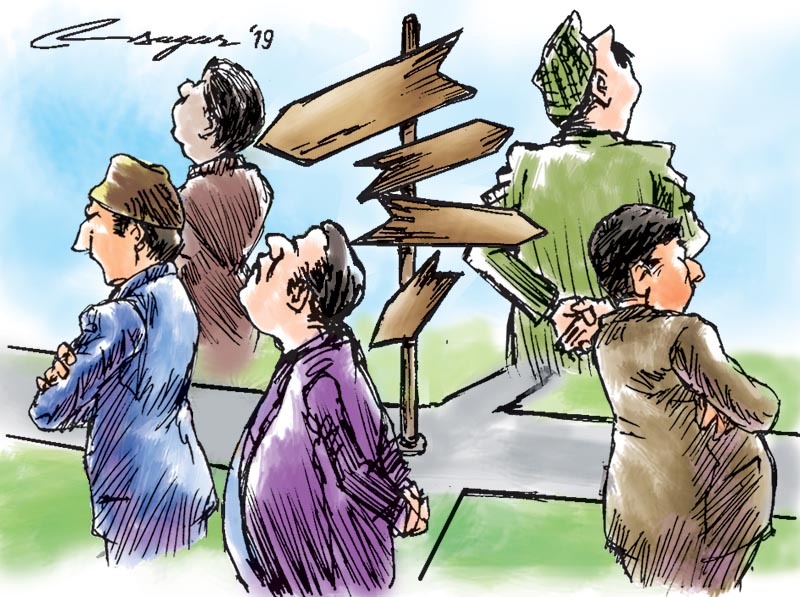Trends of instability: Clarity needed to move ahead
Dealing simultaneously with cooperating and competing regional and global super-powers in a changing global political and economic order and strategic equation demands access to right information and ability to interpret it with knowledge
A year ago, the two rival political parties — the Communist Party of Nepal (UML) and the United Communist Party of Nepal-Maoists — formed an alliance, and their merger into the larger Left Unity offered prospects of political and security stability and development after 20 years of democratic practice. The formation of the government with the support of the Madhesh-based Federal Socialist Forum and Rastriya Janata Party-Nepal paved the way for the people at large to be optimistic about the country.
The successful election of all the three levels of government, as provisioned in the constitution, brought about hope. However, polarisation between the left and right political parties persists, while a discontented Tarai is awaiting constitutional amendments. The 2015 constitution is being executed with disagreement and challenges, which may lead to political instability, economic decline and a security dilemma.
The Oli-led government was looked at with sanguinity after it assumed office, but it is now being ridiculed for failing on quite a number of fronts from within the party itself, the public and the international community. The unity of the left alliance has not materialised and is unlikely to happen anytime soon. The Madhesh-based RJP-Nepal has withdrawn support as amendments in the statute do not seem probable now.
There is political instability due to mismanaged governance in the three-tier administrative system, leading to discontent among the people. The winter session of the Federal Parliament has the constitutional deadline to amend 174 Acts to make them consistent with the constitution.
The promise to expand the economy by attracting Foreign Direct Investment has pessimistic implications. The World Bank’s 16th edition report “Doing Business 2019” ranked Nepal at 110th position among 190 countries for 2018 compared to 105th in 2017 even after the Investment Summit of 2017 had pledged US$ 13.5 billion. Inflation is on the rise for basic commodities. The stock market is in despair and casts doubt about the future of a free-market economy.
On the foreign policy front, political dialogue between Foreign Minister Pradip Gyawali and US Secretary of State Michael Richard Pompeo took place after 16 years, an expression that Nepal’s foreign policy is looking beyond its immediate neighbours after the new constitution. The foreign minister said that he would ask the US not to view Nepal through New Delhi’s eyes. The US concurrently is strengthening its National Security Strategy through alliances and partnerships at a time when China, its competitor, is getting more involved in Nepal’s economic and security activities. During the June visit to China by PM Oli, he had signed a Memorandum of Understanding that includes railway construction. Based on the trade and transit agreement, Nepal will be allowed to use Chinese ports for trade. The agreement is expected to end India’s monopoly on Nepal’s supply and security system.
After all the preparations, the last minute political decision not to take part in the BIMSTEC seven-nation joint military exercise in Pune, India was diplomatic immaturity.
On February 1, the Ministry of Foreign Affairs organised a briefing for the diplomatic community, the third of its kind after the formation of the KP Sharma Oli-led government. However, US Ambassador to Nepal Randy Berry’s conspicuous absence in the government’s briefing raised some eyebrows, and was seen as US reaction to Prachanda’s press statement in favour of Venezuelan President Nicolas Maduro, denouncing the threats made by the US and its allies to intervene in the internal affairs of Venezuela.
And on January 24, the Department of Labour and Occupational Safety issued a directive to the labour offices across the country, asking them to finalise the total number of Indian nationals working in Nepal and inform businesses to apply for labour permits for all individuals who didn’t have one yet. This caused a diplomatic stir between Kathmandu and New Delhi, leading the Indian ambassador to meet Prime Minister KP Sharma Oli and Labour Minister Gokarna Bista. The Labour Ministry said it was “a technical error” and that the government was in the process of correcting it.
For the small state, diplomacy is a tool of statecraft. Historically, foreign policy has been a vital tool of Nepali statecraft and a test of statesmanship. The nature of politics, which is witnessing fundamental changes in the entire spectrum of issues and interests, institutions and actors in the 21st century and location (in Asia between India and China), makes Nepal’s conduct of diplomacy particularly challenging.
Dealing simultaneously with cooperating and competing regional and global super-powers, often embroiled in their own internal upheavals, in a rapidly changing global political and economic order and strategic equation, demands access to right information and ability to interpret it with knowledge, understanding and experience.
The coming year will be marked by pronounced domestic and geopolitical uncertainty, and to move ahead, the government needs clear, guiding mandates on the security, diplomatic, political and economic fronts.
Basnyat is a retired Nepali Army Major General






